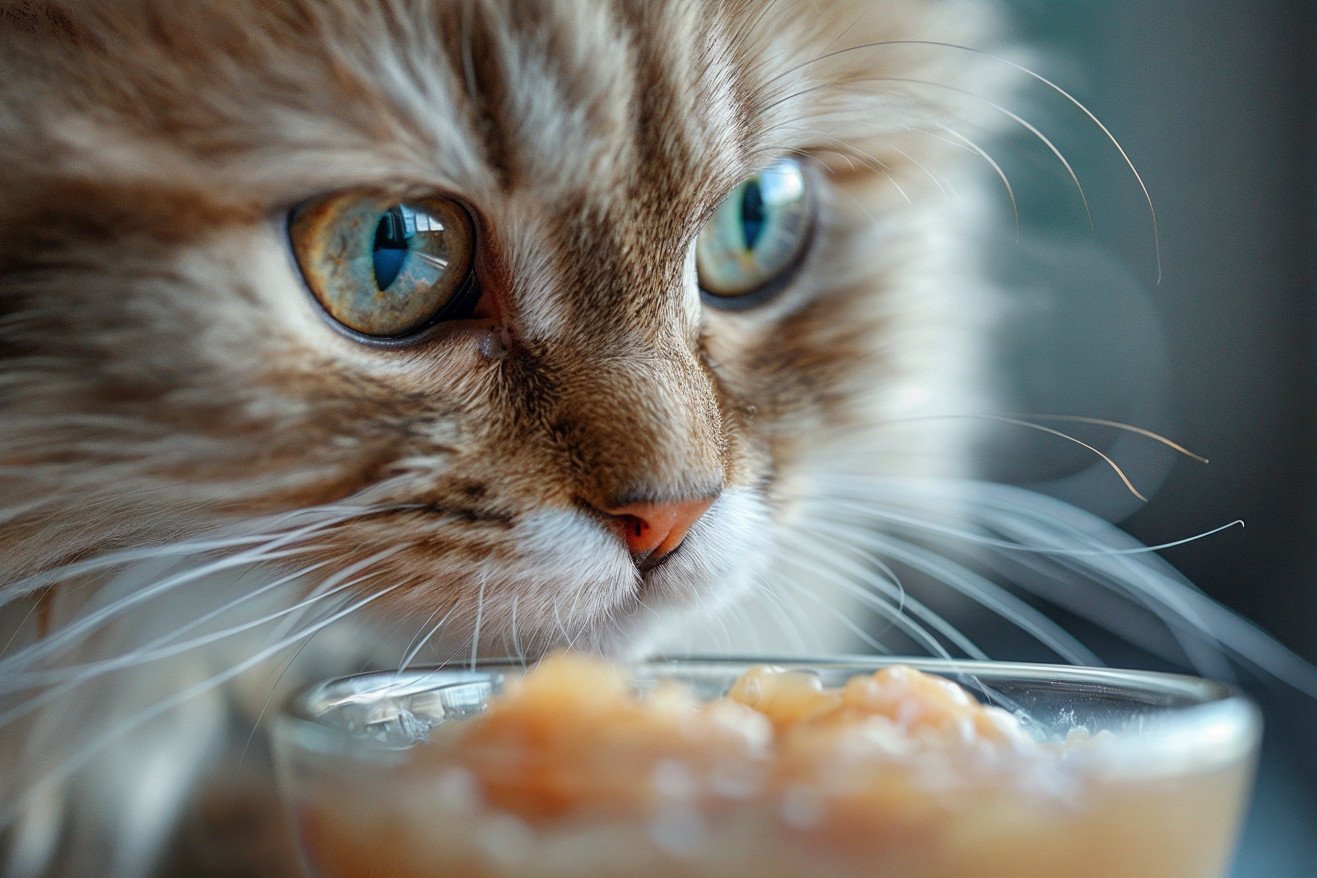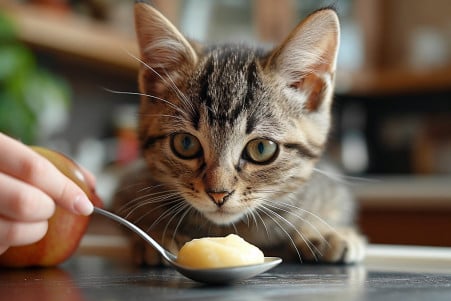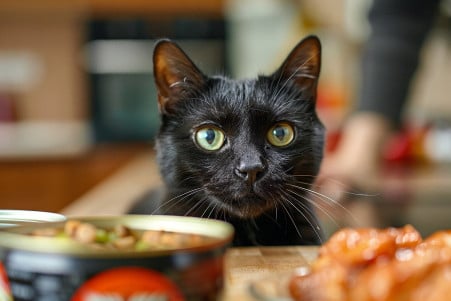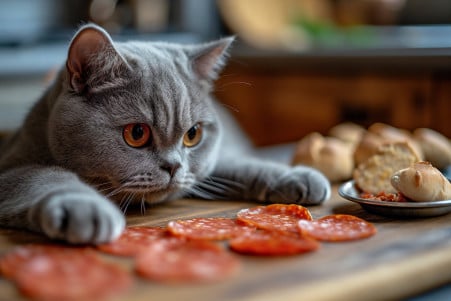Can Cats Eat Baby Food? What Vets Say
22 May 2024 • Updated 22 May 2024

If your cat is a picky eater, baby food may seem like a good solution. However, before you feed your cat baby food, it’s important to know the potential benefits and dangers. In general, most baby food is not a good option for cats because it lacks essential nutrients and may lead to digestive issues. That said, some meat-based baby foods without additives can be safe for cats in small amounts as an occasional treat.
By reviewing information from veterinarians and experts in cat nutrition, we’ll help you determine whether or not baby food can be part of a healthy diet for your cat. This will enable you to make better decisions about whether or not—and if so, which—human foods can be used to supplement your cat’s diet while still keeping their health and well-being as the top priority.
Can cats eat baby food?
What Do Cats Need in Their Diet?
As obligate carnivores, cats have very specific and unique nutritional requirements compared to other animals. Their diet must be rich in animal-based proteins, fats, and essential nutrients like taurine and arginine that can only be obtained from animal sources.
Protein should make up the majority of a cat's diet, with the Association of American Feed Control Officials (AAFCO) mandating a minimum of 26% crude protein for adult cat foods. Cats also require adequate levels of animal-sourced fats, including essential fatty acids, to meet their energy needs.
While carbohydrates are not a significant dietary need for cats, a balanced feline diet includes limited amounts along with essential vitamins like A, D, E, K and B vitamins, as well as minerals such as calcium, iron and zinc. As true carnivores, cats cannot obtain these vital nutrients from plant-based sources alone.
To ensure your cat receives all the nutrients they need in proper ratios, experts recommend feeding complete and balanced commercial cat foods that meet AAFCO guidelines. In contrast, typical baby foods lack many of the animal-sourced proteins, fats and micronutrients essential for feline health, making them nutritionally inadequate as a regular diet for cats. Understanding these unique needs lays the foundation for recognizing the risks of feeding cats improper human foods like baby food.
Potential Dangers and Drawbacks of Feeding Baby Food to Cats
While some meat-based baby foods may be okay for cats in small amounts, most baby food options come with a number of potential dangers and should not be used as a staple in a cat's diet. Preventive Vet notes that many of the ingredients found in baby food, including onions, garlic, and dairy, are toxic to cats. Onions and garlic contain sulfur compounds that can cause oxidative damage to a cat's red blood cells, which can lead to Heinz body hemolytic anemia.
In addition to the risk of toxicity, Catster explains that baby food doesn't contain the essential nutrients, including taurine, that cats need to stay healthy. Relying on baby food as a cat's main source of nutrition can lead to nutritional deficiencies that can cause health issues down the road. Many baby foods are also high in carbs and low in protein, which can lead to digestive problems like vomiting and diarrhea.
It's important to read baby food labels carefully and avoid any products that contain added sugars, preservatives, or other ingredients that could be harmful to cats. WebMD warns that baby food should be given to cats in moderation and should never be used to replace a cat's regular, well-balanced diet.
When to Feed Cats Baby Food
Although baby food is not recommended as a regular part of a cat's diet, there are a few specific cases where a vet may recommend it as a temporary dietary option. CureFIPUSA explains that baby food is easy to digest and can be very appealing to cats, especially cats that are sick, recovering from an illness, or dealing with dental problems and have lost their appetite.
If you are going to feed baby food to a cat, the best baby food options are plain, unseasoned, meat-based baby foods that don't contain any ingredients that are toxic to cats, such as onions or garlic. Animal Gator recommends that you look for chicken, turkey, or lamb baby food and avoid baby food that contains vegetables or spices.
That said, it's important to talk to a vet before making any major dietary changes, especially if you are dealing with a cat that has a health condition. The Cummings School at Tufts University explains that therapeutic diets need to be carefully formulated to make sure they meet a cat's specific nutritional requirements.
Even if it's being used as a supplement or temporary food, baby food should never be used to replace a cat's regular, nutritionally complete diet. Animal Gator stresses that it's important to monitor cats closely and gradually reintroduce them to their regular diet after any period of time when baby food is used.
Homemade Cat Food: A Healthier Alternative to Baby Food
Homemade cat food can be a healthier alternative to baby food and store-bought cat food, providing pet parents with more control over the ingredients and nutritional content in their cat's meals. Per Floppycats, making your own homemade cat food can be a safe and healthy option, as long as you're willing to invest the time in using recipes created by veterinary nutritionists to make sure your cat's diet is complete and balanced.
Homemade cat food can help you avoid potential allergens, preservatives, and fillers that are often found in commercial pet food products. Cats.com points out that homemade diets also allow you to control the quality and source of the ingredients, which can be especially important if your cat has dietary restrictions or sensitivities.
That said, RAWZ warns that making homemade cat food can be time-consuming, labor-intensive, and costly. It also requires that you have the right equipment, like a meat grinder, and that you follow food safety guidelines. It's also important to work with your vet on an ongoing basis to ensure that your cat is healthy and that all of their nutritional needs are being met when they're on a homemade diet.
Conclusion: Make Sure You're Prioritizing Your Cat's Health and Well-Being
Even though baby food may seem like a good option when your cat is being picky, it's important to know the risks and benefits before you give it to your pet. In the end, most baby foods are not a good source of nutrition for cats because they don't contain the nutrients cats need and they may cause digestive issues. That said, some meat-based baby foods without additives may be okay to give to your cat as a treat in moderation.
Cats are obligate carnivores with very specific nutritional needs that are different from other animals. Their diet needs to be high in animal-based proteins, fats, and nutrients like taurine and arginine that can only be found in animal products. To make sure your cat gets the right nutrients in the right proportions, experts recommend feeding them commercial cat foods that are complete and balanced and meet AAFCO standards.
Preventive Vet explains that many ingredients found in baby food, such as onions, garlic, and dairy, are toxic to cats. In addition, the high carbohydrate and low protein content of many baby foods can cause digestive problems like vomiting and diarrhea. Catster notes that baby food is often missing the essential nutrients, like taurine, that cats need to stay healthy.
While baby food may be a good short-term option or a way to supplement your cat's diet during a transition, CureFIPUSA warns that it should never be used as a replacement for a cat's regular, balanced diet. Floppycats points out that making your own homemade cat food can be a good choice as long as you're willing to invest the time and effort it takes to follow recipes that have been created by veterinary nutritionists and ensure that your cat's diet is complete and balanced.
By learning about your cat's nutritional needs and making informed decisions, you can make sure that you're prioritizing your cat's health and well-being.


